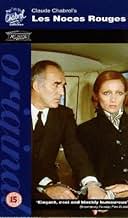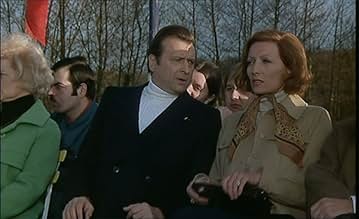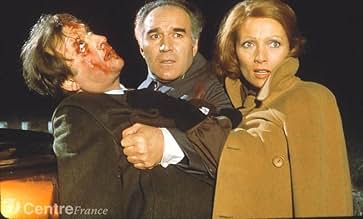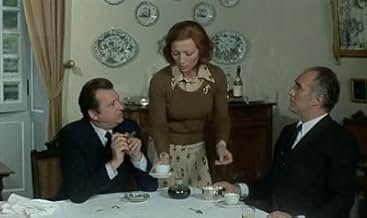IMDb रेटिंग
6.9/10
2.2 हज़ार
आपकी रेटिंग
अपनी भाषा में प्लॉट जोड़ेंIn a small French town, the mayor discovers his wife is cheating on him, a betrayal that eventually leads to murder.In a small French town, the mayor discovers his wife is cheating on him, a betrayal that eventually leads to murder.In a small French town, the mayor discovers his wife is cheating on him, a betrayal that eventually leads to murder.
- पुरस्कार
- 1 जीत और कुल 1 नामांकन
फ़ीचर्ड समीक्षाएं
Behind every film there lies a story which is certainly true of this one as Michel Piccoli as Pierre and Stéphane Audran as Lucienne are based upon Bernard and Yvette, the 'diabolical lovers' of Bourganeuf. Indeed the film's release had to be postponed so as not to coincide with the murder trial.
Although lacking the stylistic brilliance of some of Chabrol's other works in this genre, it's construction, precision and refinement are those of a director eminently secure in his material.
Here Valencay stands in for Bourganeuf and becomes an unflattering portrait of provincial France. Its mean-spirited and hypocritical denizens thrive on prurient gossip which motivates Pierre and Lucienne, aware of their bourgeois social status, to become secret murderers rather than public adulterers.
What is most striking about the film is the gradual darkening of tone, not least when Claude Piéplu as the pompous husband ceases to be a figure of fun and shows his true colours and whose brutal demise is brilliantly realised. The downbeat ending with the final shot of the couple's shackled hands is most effective whilst Pierre Jansen's score is well integrated.
The opening quotation from the third part of the 'Oresteia' of Aeschylus leads us to believe that the film will deal with moral complexity but in reality one can feel no sympathy at all for Pierre and Lucienne for had they not been so obsessed with appearances they could have simply left their troublesome partners rather than bumping them off. The overriding emotion, for this viewer at any rate, is one of pity, for like so many literary/cinematic couples who have done away with inconvenient spouses, the initial feeling of 'freedom' is an illusion as they have merely swapped one kind of entrapment for another.
Although lacking the stylistic brilliance of some of Chabrol's other works in this genre, it's construction, precision and refinement are those of a director eminently secure in his material.
Here Valencay stands in for Bourganeuf and becomes an unflattering portrait of provincial France. Its mean-spirited and hypocritical denizens thrive on prurient gossip which motivates Pierre and Lucienne, aware of their bourgeois social status, to become secret murderers rather than public adulterers.
What is most striking about the film is the gradual darkening of tone, not least when Claude Piéplu as the pompous husband ceases to be a figure of fun and shows his true colours and whose brutal demise is brilliantly realised. The downbeat ending with the final shot of the couple's shackled hands is most effective whilst Pierre Jansen's score is well integrated.
The opening quotation from the third part of the 'Oresteia' of Aeschylus leads us to believe that the film will deal with moral complexity but in reality one can feel no sympathy at all for Pierre and Lucienne for had they not been so obsessed with appearances they could have simply left their troublesome partners rather than bumping them off. The overriding emotion, for this viewer at any rate, is one of pity, for like so many literary/cinematic couples who have done away with inconvenient spouses, the initial feeling of 'freedom' is an illusion as they have merely swapped one kind of entrapment for another.
Under the surface of middle class boredom and entrapment, love for the forbidden and unattainable drives two respectable, kind people to murder. It isn't realistic, yet feels real, as does the daughter's unconscious urge to destroy her beloved mother. The murder victims are at once pitiable and richly deserve their ends. The performances are great all round.
I was very surprised upon reading some of the comments for this film after having seen it - not only is this not a lesser Chabrol movie or a non-entertaining one, for my money its Chabrol at his subtle and intriguing best, and no doubt up there with the likes of The Unfaithful Wife and Le Boucher! The plot is not particularly original, but it's not too important as it's Chabrol's style and attention to detail that really makes the film what it is anyway. The plot seems to take a lot of influence from the classic 'The Postman Always Rings Twice' and focuses on murder due to an illicit love affair. Lucienne Delamare is not so happily married to town major Paul Delamare and, unbeknown to her husband, is currently engaged in an affair with her husband's assistant Pierre Maury. The two are able to spend time together because Paul is often away on business. Pierre's wife Clotilde is weak and sick and when she dies suddenly, the town suspect suicide; but the truth is more sinister, as revealed by Pierre's confession to Lucienne...
The film is kept interesting as Chabrol always focuses on the important elements and ensures that the chemistry between the leads is always engaging. The acting is once again superb with Chabrol's beautiful wife (at the time) Stéphane Audran being suitably brooding and mysterious in the lead role and receiving excellent support from Michel Piccoli and Claude Piéplu. The village in which the film takes place is also well thought out and Chabrol manages to create a foreboding atmosphere stemming from that. As usual with Chabrol films, this one is beautifully shot and realised and it's clear that the director put a lot of care and attention into the film. As usual, the suspense is generated through intrigue and the way that the characters are developed rather than through scenes of tension, though there are some brilliant sequences in the film - a pivotal scene towards the end involving a car accident being particularly noteworthy. I wouldn't recommend this film as a starting point for someone who has not previously seen a Claude Chabrol film, but I'd be surprised if fans of his don't enjoy it. Highly recommended!
The film is kept interesting as Chabrol always focuses on the important elements and ensures that the chemistry between the leads is always engaging. The acting is once again superb with Chabrol's beautiful wife (at the time) Stéphane Audran being suitably brooding and mysterious in the lead role and receiving excellent support from Michel Piccoli and Claude Piéplu. The village in which the film takes place is also well thought out and Chabrol manages to create a foreboding atmosphere stemming from that. As usual with Chabrol films, this one is beautifully shot and realised and it's clear that the director put a lot of care and attention into the film. As usual, the suspense is generated through intrigue and the way that the characters are developed rather than through scenes of tension, though there are some brilliant sequences in the film - a pivotal scene towards the end involving a car accident being particularly noteworthy. I wouldn't recommend this film as a starting point for someone who has not previously seen a Claude Chabrol film, but I'd be surprised if fans of his don't enjoy it. Highly recommended!
This film has a persistently artificial feel to it that at times serves it well and at times is a hindrance - it sometimes serves to highlight the hypocrisy and corruption of the milieu and give the central characters a decadent air, but at times it interferes with character development, as it interferes with our understanding of the characters. The plot itself is rather conventional but is essentially an excuse to dissect a certain milieu. The most interesting character is in my opinion very underrated: the mayor's stepdaughter, who is clearly intelligent, somewhat sombre but decidedly not bookish. She is the sole character that does not seem motivated by purely selfish, fairly conventional motives (money, political ambition, boredom, sexual desire, etc), making her motivations harder to fathom. She is the only character with any real mystery about her; it's hinted she has some kind of fascination with death, and she makes a surprising comment related to the role of women, all of which add to her ambiguity as a character.
I believe this film is based on a real double murder by Bernard Coustie in 1970, and follows that closely until the final scenes. I was shocked by the Benny Hill quality of the love scenes which undermines the early scenes. The acting as a whole has a semi-comic feel and the film is short and feels perfunctory - if it wasn't Chabrol would we even remember it?
However, the score is terrific, and as a time-capsule of small town France it is entertaining.
क्या आपको पता है
- ट्रिवियाFrench visa # 40378.
- कनेक्शनFeatured in La cérémonie (1995)
टॉप पसंद
रेटिंग देने के लिए साइन-इन करें और वैयक्तिकृत सुझावों के लिए वॉचलिस्ट करें
- How long is Wedding in Blood?Alexa द्वारा संचालित
विवरण
- रिलीज़ की तारीख़
- कंट्री ऑफ़ ओरिजिन
- भाषा
- इस रूप में भी जाना जाता है
- Wedding in Blood
- फ़िल्माने की जगहें
- Valençay, Indre, फ़्रांस(main location: street scenes, cemetery, Maury's apartment 31 Rue de la République)
- उत्पादन कंपनियां
- IMDbPro पर और कंपनी क्रेडिट देखें
- चलने की अवधि
- 1 घं 35 मि(95 min)
- ध्वनि मिश्रण
- पक्ष अनुपात
- 1.66 : 1
इस पेज में योगदान दें
किसी बदलाव का सुझाव दें या अनुपलब्ध कॉन्टेंट जोड़ें

























